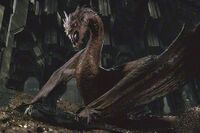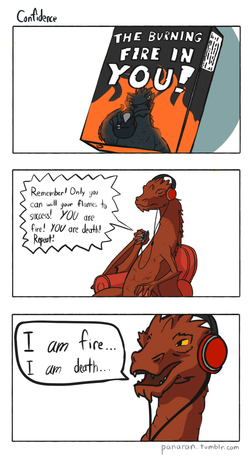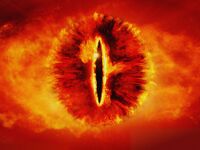Smaug
Smaug is the leading "bad boy" in the epic The Lord of the Rings prequel The Hobbit. He is a dragon (Latin: Dragonosaurs Bigbastardus) who lives under a mountain and directly above a huge hoard of stolen dwarven treasure. He is one of the greatest dragons ever hatched, but with an ego bigger than the whole of Middle Earth and only 12% smaller than Donald Trump’s. He also has a sharp sense of humour and is by far the most interesting character in the story. Alas for Smaug, "history is written by the victors" and his story comes to us through authors who never had one good word to sing about him.
Origins[edit]
Like all red dragons, Smaug originated in Snowdonia (Welsh: Eryri) in Gwynedd, North Wales. Consequently, he can sing in close harmony, name more than one breed of sheep, and drone on endlessly about 1970s Rugby.
The author of The Lord of the Rings, the fusty Oxford university don Professor J. R. R. Tolkien, skimps a bit on Smaug's origins,[1] only vaguely implying that Smaug came from somewhere off the top of the page. Dragons, like all reptiles, are instinctively evil and greedy: crocodiles eat babies and covet antique clocks, while chameleons keep their independently operating eyes on the Nasdaq in the hope of shorting the stock of social enterprises. Smaug takes no interest in his treasure's actual monetary value, and foreswears trading with it on the Gondor Stock Market, buying dragon-sized luxuries, or going on a long cruise. Instead, Smaug simply lies on his loot, creating a waistcoat of gems on his soft belly, much like Jeff Bezos.
How Smaug got his money is told in the book by the dwarves and shown in the film trilogy of The Hobbit. The dwarves of Mount Erebor, or The Lonely Mountain,[2] had created a wealthy metropolis for short fat hairy men. Smaug didn't put in a bid for the business but executed a hostile takeover, swooping down one day and taking it, killing or driving away all those who resisted. The dwarves went into the treacle-mining business and contracted an open, pluralistic marriage with Snow White but now they want their loot back. Skint due to a collapse in the treacle market, they are forced to ally themselves with an itinerant card-sharp and conjurer posing as a wizard, Gandalf, and a hairy-footed hobbit who claims to be the Raffles of Middle Earth.
Loose talk[edit]

Smaug is blissfully unaware of events outside his haunt. Though Sauron is just a quick flight away in Dol Guldur, the two evil beings never seem to have met. Neither does Smaug make house calls on the Balrog in Moria, or write to the orcss to ask if they had seen any strange folk in the area. Perhaps being evil makes it difficult to work together.
Smaug is likewise unaware of anything afoot (booted or hairy) when Bilbo the hobbit sneaks into Smaug's home and steals the cup he had won for being the nastiest dragon in class: Third Age. The basilisk sniffs the air and works out that the thief runs with dwarves. Bilbo is caught by the dragon but, thanks to his magic ring, he remains unseen by Smaug. There then follows a game of riddles, black jack, canasta and gin rummy. Smaug is angry to lose all the games and tries to drown his frustration in food, to-wit: Bilbo as a quick snack. When that fails, he flies away and looks for a banquet in Lake Town.
Death to the dragon[edit]
At first, like the Russian Air Force levelling Ukrainian cities, it seems impossible to stop the pissed-off dragon. He destroys Lake Town, cackling to himself as he does it. Then a bird gives Bard the Bowman a Stinger missile. This laser-guided, precision weapon was developed by Mirkwood elves, its devastating high-explosive warhead created by Gandalf himself, and its sophisticated, gyroscopic control-system fashioned by the craftsmen of Gondor. Strangely, though the laser-technology and the microprocessors in the guidance-system had been known since the previous age, Middle Earth was yet to invent electricity, and Lake Town itself had always been totally 'off the grid'. Thus, this highly-engineered $4 million projectile was little more than a heavy arrow.
Nevertheless, Smaug should have understood his peril; when an out-of-favour archer acquires an arrow second-hand, breaks his bow and has to use his son to steady his aim, and fires on the dragon in flight during a major weather event, it is a Hollywood cinch that the arrow will find its mark, a tiny gap in Smaug's bling right next to his black heart. That's it; Smaug falls out of the sky and the weather forecast for the next week is steam.
Anticlimax[edit]
Smaug's death means all his possessions are up for the grabs, though according to Lonely Mountain's advanced constitution, beneficiaries should first have applied to the Court of Chancery for the process of Probate to begin. The estate should then properly have been held in escrow until such time as the High Court (or a Magistrate's Court acting under the direction and supervision of the High Court) should agree to the fair division of the estate's assets among the named beneficiaries (or beneficiary should the deceased have named only one) of the will (having first settled all outstanding debts owed to any legal representative working on behalf of the beneficiary (or beneficiaries). This process to be undertaken under the direction of any executor (or executors) named within the will or appointed by the High Court (or a Magistrate's Court acting under the direction and supervision of the High Court).
Having a life expectancy of over a thousand years, it is perhaps understandable that Smaug had failed to deposit a witnessed Will and Testament with his legal representative. Since he died intestate, it entirely lawful for everyone to pile in to grab his share under Middle Earth's longstanding twin legal precepts: Might is Right and First Come, First Served. Those scrabbling for their share included the orcs, who want the treasure for themselves (to invest in China perhaps?), but they are defeated by an alliance of Gandalf, Bilbo, dwarves, elves and men.[3] The dragon has gone! Smaug never got around to dictating his memoirs either, leaving that job to authors like Tolkien who were unabashedly rooting for Smaug's adversaries.
Footnotes[edit]
- ↑ Smaug's younger brother Puff was a 'big bong' in drugs and songs for children.
- ↑ If you're a lonely mountain, you can find help and support from
TheSamaritans.com - ↑ Orc poet Dylan 'Sharpfang' Thomas wrote Under Mirkwood to lament the goblin defeat.
| |||||||||||||||||||



